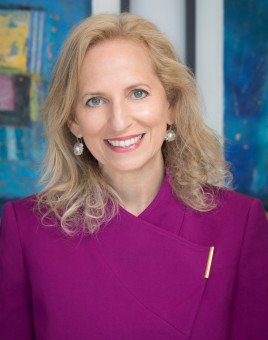
What are you up to these days?
Currently, Antonia is the Director and Head of Entity of the United Nations Interregional Crime and Justice Research Institute (UNICRI), where she oversees over 50 full-time staff and about 20 interns a year. Her office is located in Turin, Italy. UNICRI focuses on research and capacity building in crime prevention, criminal justice, security, counter-terrorism, and the rule of law.
How did you get your job?
After law school, Antonia worked for Markowitz Herbold PC for about 3 years practicing commercial litigation. This was a fabulous place to practice law. One day Antonia went to lunch with her mentor, and they started discussing new horizons in the law. Unbeknownst to her, Antonia’s mentor had been waiting for this topic to come up; she opened her bottom drawer to pull out an application for the ABA Central & East European Law Initiative (CEELI), a pro bono program for lawyers now known as the ABA Rule of Law Initiative (ROLI).
After Antonia completed her volunteer assignment in Moldova for ABA CEELI, she was offered her first paid international position with the Human Rights Chamber for Bosnia & Herzegovina, the human rights tribunal established by the Dayton Peace Agreement. After a while, she started applying for positions in the U.N. but was unsuccessful. Finally, she asked a friend who worked for the U.N. in human resources for advice, and she was advised to get a “Masters” degree, since a JD is not well known in the the international community, and a masters is a requirement to join the U.N. at the professional level. So Antonia completed a Masters in Public Administration with the Harvard Kennedy School, and by the time she graduated, she had three offers from the U.N.
Starting in 2009, Antonia was as a senior official with 6 U.N. entities in 8 countries on 4 continents, including the United Nations Children’s Fund (UNICEF) in Sri Lanka, the United Nations Relief and Works Agency for Palestine Refugees in the Near East (UNRWA) in Jordan, and the United Nations Support Mission in Libya (UNSMIL) in Libya. This experience ultimately led her to her current post with UNICRI.
What advice would you give to a graduating student who's looking for a job?
For anyone who wants to work for the U.N., Antonia has the following practical advice:
- Get dual citizenship if you are eligible. For Antonia, this took 8 years of diligent work for her to be recognized as a dual citizen;
- Get a PhD in a relevant area of international work, because a terminal degree (i.e., the highest level of education possible) will be recognized and respected around the world;
- Learn another U.N. language through a certified or accredited program, so that you have evidence you can include on your C.V.; and
- Finally, develop multiple skills you enjoy that are also transferrable. Know what you bring to the table.
As for anyone who is interested in working in human rights in particular, Antonia advises that the work is extremely difficult. To preserve a sense of sanity from the second-hand trauma, Antonia suggests developing at least one complementary area of expertise. For her, they are rule of law and management/coordination. These complementary skills have allowed Antonia to balance her positions so that she is not always on the front line with victims on a day-to-day basis. She also advises to practice techniques of self-care to actively protect your mental health.
For anyone who would like to intern for UNICRI (or for any U.N. entity for that matter), you must apply through the United Nations portals. For U.N. Secretariat entities, that is Inspira. U.N. internships are for 6 months, unpaid, and UNICRI receives applications from all over the world.
The Development & Alumni Office is located in room #301 of Legal Research Center on the Law Campus.
MSC: 51
email lawalum@lclark.edu
voice 503-768-6890
The Development & Alumni Office
Lewis & Clark Law School
10101 S. Terwilliger Boulevard MSC 51
Portland OR 97219